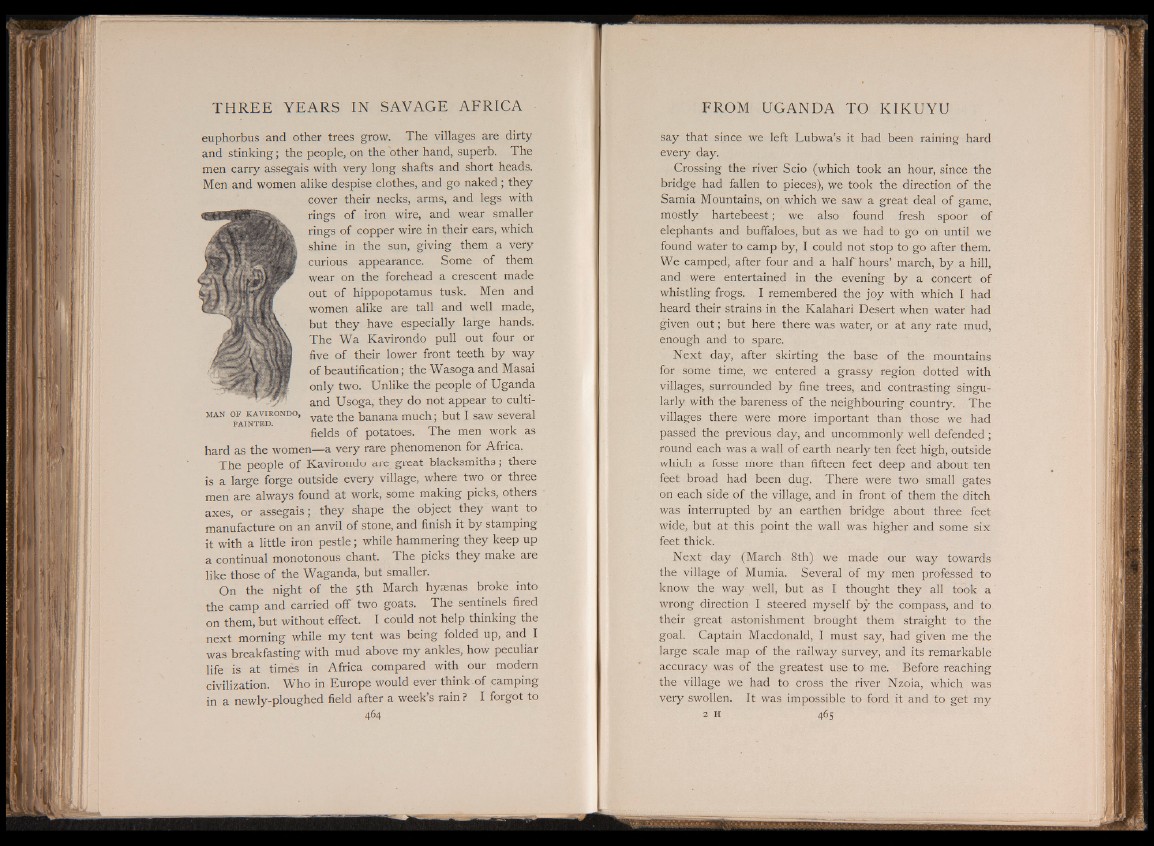
euphorbus and other trees grow. The villages are dirty
and stinking; the people, on the other hand, superb. The
men carry assegais with very long shafts and short heads.
Men and women alike despise clothes, and go naked; they
cover their necks, arms, and legs with
rings of iron wire, and wear smaller
rings of copper wire in their ears, which
shine in the sun, giving them a very
curious appearance. Some of them
wear on the forehead a crescent made
out of hippopotamus tusk. Men and
women alike are tall and well made,
but they have especially large hands.
The Wa Kavirondo pull out four or
five of their lower front teeth by way
of beautification; the Wasoga and Masai
only two. Unlike the people of Uganda
and Usoga, they do not appear to cultivate
the banana much; but I saw several
fields of potatoes. The men work as
hard as the women—a very rare phenomenon for Africa.
The people of Kavirondo are great blacksmiths; there
is a large forge outside every village, where two or three
men are always found at work, some making picks, others
axes, or assegais; they shape the object they want to
manufacture on an anvil of stone, and finish it by stamping
it with a little iron pestle; while hammering they keep up
a continual monotonous chant. The picks they make are
like those of the Waganda, but smaller.
On the night of the 5 th March hyaenas broke into
the camp and carried off two goats. The sentinels fired
on them, but without effect. I could not help thinking the
next morning while my tent was being folded up, and I
was breakfasting with mud above my ankles, how peculiar
life is at times in Africa compared with our modern
civilization. W ho in Europe would ever think -of camping
in a newly-ploughed field after a week s rain ? I forgot to
464
MAN OF KAVIRONDO,
FAINTED.
say that since we left Lubwa’s it had been raining hard
every day.
Crossing the river Scio (which took an hour, since the
bridge had fallen to pieces), we took the direction of the
Samia Mountains, on which we saw a great deal of game,
mostly hartebeest; we also found fresh spoor of
elephants and buffaloes, but as we had to go on until we
found water to camp by, I could not stop to go after them.
We camped, after four and a half hours’ march, by a hill,
and were entertained in the evening by a concert of
whistling frogs. I remembered the joy with which I had
heard their strains in the Kalahari Desert when water had
given out; but here there was water, or at any rate mud,
enough and to spare.
Next day, after skirting the base of the mountains
for some time, we entered a grassy region dotted with
villages, surrounded by fine trees, and contrasting singularly
with the bareness of the neighbouring country. The
villages there were more important than those we had
passed the previous day, and uncommonly well defended ;
round each was a wall of earth nearly ten feet high, outside
which a fosse more than fifteen feet deep and about ten
feet broad had been dug. There were two small gates
on each side of the village, and in front of them the ditch
was interrupted by an earthen bridge about three feet
wide, but at this point the wall was higher and some six
feet thick.
Next day (March 8th) we made our way towards
the village of Mumia. Several of my men professed to
know the way well, but as I thought they all took a
wrong direction I steered myself by the compass, and to.
their great astonishment brought them straight to the
goal. Captain Macdonald, I must say, had given me the
large scale map of the railway survey, and its remarkable
accuracy was of the greatest use to me. Before reaching
the village we had to cross the river Nzoia, which was
very swollen. It wras impossible to ford it and to get my
2 h 465